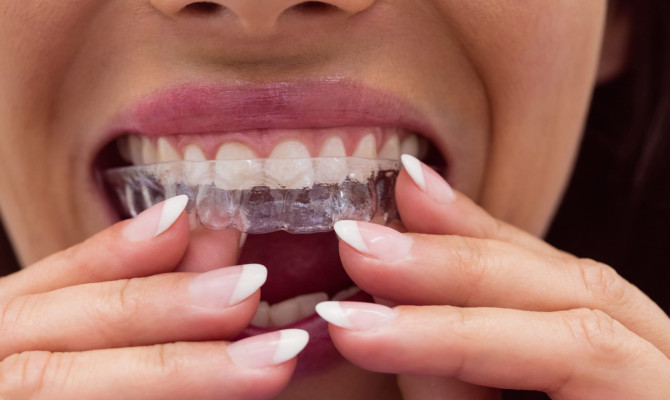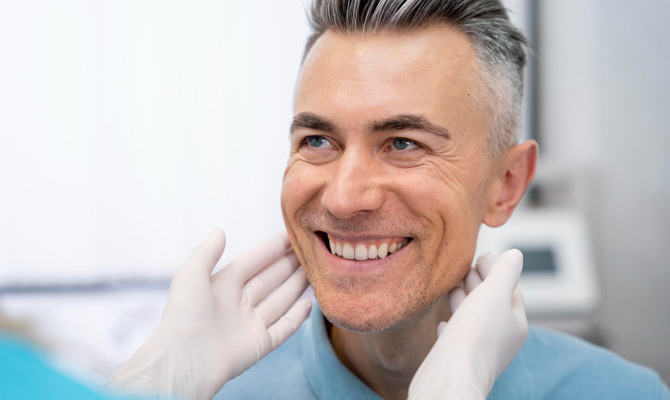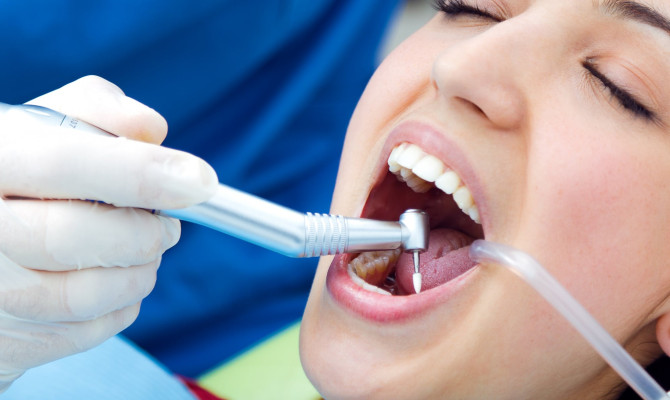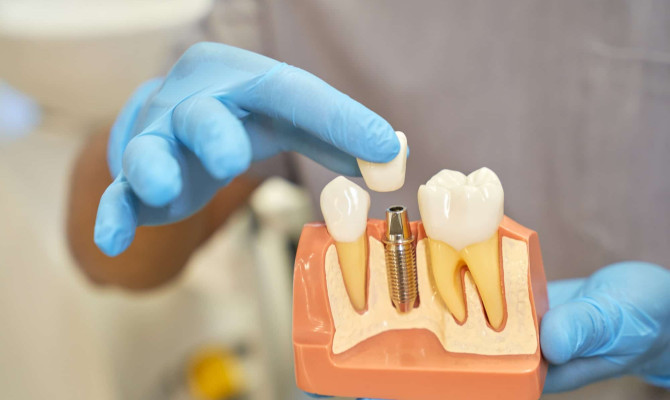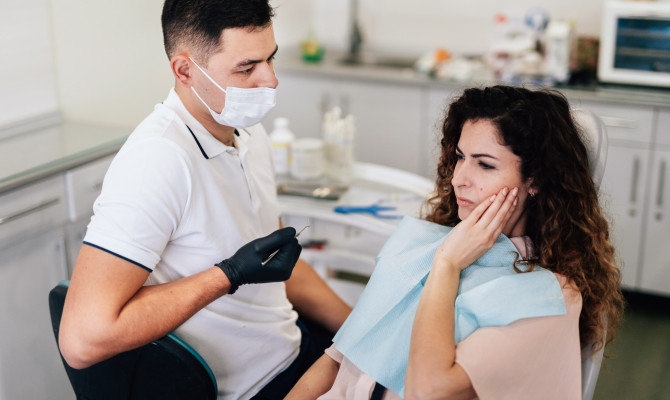A complete guide to Night guards

- Night Guard
- 16 Aug 2023
Overview
About Night guards
Our overall well-being depends on getting a good night’s sleep since it enables our bodies and minds to unwind and recharge. But for many people, oral problems at night can become a problem. Numerous people experience frequent grinding and clenching as they sleep, sometimes subconsciously, which can cause various tooth issues.
Fortunately, dental professionals have developed night guards as a straightforward yet efficient solution to protect your teeth and encourage a comfortable night’s sleep.9Overview| Researched based study from Dentalhealth.org
We will look at the importance of night guards in this article and their advantages, applications, and care.

Benefits
What does a Night guard do?
- Protects your teeth
- Reduces the strain on jaw muscles
- Reduces discomfort
- Reduces Temporomandibular joint issues (TMJ)
- Relieves headaches
- Protects your pre-existing dental work.
It is an oral device called an occlusal splint intended to guard the teeth and jaws as you sleep. It is primarily used to treat the adverse effects of bruxism, which is the habit of clenching or grinding the teeth, usually subconsciously, while sleeping.9Benefits| Researched based study from Dentalhealth.org
Safeguards teeth
- Between the upper and lower teeth, it serves as a cushion barrier.
- When you clench or grind your teeth while you sleep, it distributes and absorbs the pressures, preventing the teeth from coming into direct contact.
- This result lowers the possibility of tooth injuries, such as chipping, cracking, or enamel degradation.9Benefits| Researched based study from Dentalhealth.org
Minimizes muscle tension
- The extreme strain that bruxism places on the jaw muscles can cause pain and discomfort in the jaw.
- Allowing a tiny space between the upper and lower jaws helps reduce this stress.
- It lessens tension on the jaw muscles and lowers jaw discomfort and soreness by promoting a more relaxed jaw posture.
Minimizes TMJ-related problems
- Bruxism can impact the temporomandibular joint, which joins the jaw to the skull.
- This joint can become overworked by excessive clenching or grinding, which can cause conditions that cause clicking, popping, or restricted jaw mobility.
- The night guard aids in dispersing forces and lessening joint stress, potentially lowering TMD-related problems.9Benefits| Researched based study from Dentalhealth.org
Alleviates headaches
- Bruxism can aggravate migraines or tension headaches.
- It may help lower the severity and frequency of these headaches by safeguarding a barrier between the teeth and absorbing the pressures applied.
Safeguards dental work
- Grinding or clenching can put too much pressure on dental restorations like crowns, bridges, or veneers, which can cause damage or dislodgment.
- The guard serves as a shield, preserving and extending the life of your dental work.
Improving sleep quality
- They provide a sound barrier, muffling the noise produced during grinding and allowing for better sleep quality.9Benefits| Researched based study from Dentalhealth.org
Bruxism
What is bruxism?
Bruxism is characterized by excessive teeth grinding or jaw clenching, occurring unconsciously during sleep or waking hours. It can affect both children and adults and may have various causes.
Causes
- Emotional or psychological stress and anxiety
- Irregular contact between upper and lower teeth is commonly called malocclusion.
- Occurs commonly in people with sleep apnea or snoring.
- Excessive alcohol consumption and lifestyle factors aggravate bruxism.2Bruxism| Researched based study from Nlm.nih.gov
Symptoms
- Teeth grinding or clenching
- Tooth damage
- Jaw pain and facial discomfort
- Headaches and earaches
- Facial pain
- Sleep disturbances.2Bruxism| Researched based study from Nlm.nih.gov
Types
Types of Night guards
Soft
- Night guard for teeth material comprises a flexible and silicone-like or soft thermoplastic called occlusal splints.
- They have a relaxing effect and make clothing more comfortable.
- They are excellent for people who prefer a softer feel or have mild to moderate bruxism.5Types| Researched based study from Nlm.nih.gov
Hard
- In addition, they are known as rigid acrylic splints.
- In comparison to the soft ones, they provide a better level of durability and protection.
- They are usually advised for those who have more severe bruxism.5Types| Researched based study from Nlm.nih.gov
Two layers
- They comprise a hard outer layer and a soft interior layer. This provides improved comfort while enabling excellent protection.
Custom-fit
- They are designed specifically to fit each person’s teeth.
- Usually, a dental laboratory will fabricate them using an imprint of the patient’s teeth since they are made specifically for each individual and provide the finest fit, comfort, and protection.8Types| Researched based study from Nlm.nih.gov
Over-the-counter
- They can be purchased already created without the assistance of a dental expert.
- They are designed to give a universal fit and are available in various sizes and patterns.
- They might provide a different degree of safety or comfort.10Types| Researched based study from Nlm.nih.gov
Maintenance
How to use a Night guard?
You need to know how to use and when to use a night guard correctly to achieve the utmost benefit of your oral health. Here are some of the things you need to know if you are using one.
Is it okay to sleep with a night guard?
- Yes, it is typically beneficial to use a night guard when sleeping. If you frequently grind or clench your teeth while you sleep or have been diagnosed with bruxism. They can shield you from tooth problems.9Maintenance| Researched based study from Dentalhealth.org
Is it safe to wear a night guard all day?
They are primarily intended for use at night while you sleep. While it could be tempting to wear it all day to provide more protection or comfort, doing so is typically not advised. This is why:
- Jaw muscles get tired and hurt.
- It may interfere with your capacity for clear speech.
- It could obstruct the mouth’s normal airflow and saliva flow. Maintaining oral hygiene requires the proper functioning of saliva. It can be blocked and trapped, which promotes bacterial development and raises the possibility of oral health problems.
- It may put too much strain on the joint that links the jawbone to the skull, resulting in TMJ issues and discomfort.9Maintenance| Researched based study from Dentalhealth.org
Here is a guide on how to use and care for a night guard
- Rinse your night guard with lukewarm water after each use to remove dirt or saliva.
- To gently clean it, use a soft toothbrush, mild soap, or non-abrasive toothpaste.
- Hard water should not be used as it may deform the cloth.
- Do not use abrasive cleaners or other powerful chemicals that might harm your property.
- Cleaning it regularly is essential to maintaining oral hygiene.
- Follow the precise wear instructions that your dentist or the manufacturer has supplied.
- Discuss altering or replacing it with your dentist if it hurts or causes discomfort.3Maintenance| Researched based study from Uci.edu
Precautions
Precautions to be taken while using Night guards
Storage
- Before storing your night guard, make sure it is totally dry. Bacterial growth may be promoted by moisture.
- Store it in a vented storage container to guard against harm and avoid contamination.
- Please keep it away from too-hot places, such as direct sunshine.3Precautions| Researched based study from Uci.edu
When should I call the dentist if I use a night guard?
- Assess your dental health, check the fit and efficiency of your night guard, and discuss any potential issues with your dentist.
Night guards with dentures
- It usually isn’t necessary to use a guard if you have dentures. Your dentist may suggest a particular splint for protection if you still have any natural teeth prone to grinding.7Precautions| Researched based study from Nlm.nih.gov
Night guards for children
- The general opinion is that young children should not wear night guards, especially those with baby teeth. Children’s teeth grinding is frequently a passing phase that goes away independently. However, speaking with a pediatric dentist if you have any worries is preferable.6Precautions| Researched based study from Nlm.nih.gov
How long should I wear a night guard?
- The length of time depends on the person and the severity of their bruxism. Your dentist will decide what is best for you based on your needs.
Side effects
Risks and side effects of wearing a Night guard
TMJ issues
- Sometimes using a night guard can worsen TMJ problems or cause additional symptoms.
- Jaw discomfort, popping or clicking sounds from the jaw joint, and restricted jaw mobility are possible symptoms.
- It may causes displacement or misalignment of the teeth
- Rarely, repeated or incorrect usage might cause tooth movement or misalignment.
- Uneven dental pressure that gradually changes the normal bite might result in this.
Allergic responses
- If a person is allergic or sensitive to a specific chemical, they may experience allergic responses.
- There may be signs, including swelling, redness, or breathing problems.
Adjustments and discomfort
- Wearing a sleep guard could make your mouth feel tight or uncomfortable.4Side effects| Researched based study from Nlm.nih.gov
Takeaway
Takeaway tips
- Night guards are good bruxism management tools.
- Proper care, regular dental checkups, and open contact with your dentist are necessary for optimum usage.
- They are not a solution for bruxism; therefore, controlling stress and treating underlying reasons are equally crucial for maintaining good dental health in the long run.
Any feedback on this article?
 This Articles content was accurate
This Articles content was accurate Very Informative Article
Very Informative Article I have a question or a comment
I have a question or a comment
 This article contains inaccurate content
This article contains inaccurate content This article was not helpful
This article was not helpful I have a question or a comment
I have a question or a comment
We appreciate your helpful feedback!
Checkout our social pages
References
-
National Library of Medicine
Bruxism Management | Overview | Uses
-
National Library of Medicine
Bruxism: A Literature Review | Bruxism
-
UCI Student Health Center
How to Care for your Nightguard | Maintenance
-
National Library of Medicine
Unintended changes to the occlusion following the provision of night guards | Side effects
-
National Library of Medicine
Soft versus hard occlusal splint therapy in the management of temporomandibular disorders | Types
-
National Library of Medicine
Compliance of children and youngsters in the use of mouthguards | Precautions
-
National Library of Medicine
Denture care practice among patients attending the prosthetic clinic in a Nigerian teaching hospital | Precautions
-
National Library of Medicine
The Influence of Customized Mouthguards on the Muscular Activity of the Masticatory Muscles at Maximum Bite and Motor Performance During Static and Dynamic Exercises
-
Oral Health Foundation
MOUTHGUARDS | Overview | Benefits | Maintenance
-
National Library of Medicine
Over-the-counter performance enhancing mouthguards are unable to decrease blood lactate and improve power output during a Wingate anaerobic test | Types












